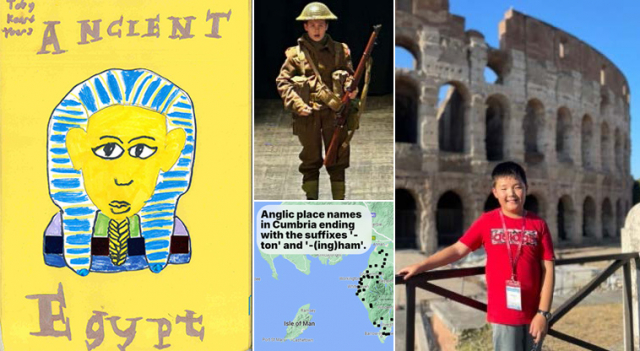Young Historian Awards 2024 – the winners

Young Historian Principal Winners 2024
Spirit of Normandy Trust Senior
- Vivaan Davda – The Cathedral and John Connon School, Mumbai
Spirit of Normandy Trust Key Stage 3
- Joshua Broadbent – Royal Grammar School, Guildford
Spirit of Normandy Trust Primary
- Salisbury Cathedral School
Best School History Magazine [sponsored by the Mid-Trent and Mercia Branch]
- St Alban’s School
- Stockport Grammar School
- High Storrs School, Sheffield
- Loughborough Grammar School
World War One [Key Stage 3]
- Arthur Thompson – Bromsgrove School
- Emma Elg – St Paul’s Girls School, London
World War One [GCSE Level]
- Kaleb Peeters – Queen Elizabeth Grammar School, Wakefield
- Asim Shah – Queen Elizabeth Grammar School, Wakefield
- Alexander Murphy – King Edward VI School, Southampton
Modern Studies [GCSE Level] [sponsored by Nuneaton Branch]
- Isaac Hussey – Lancing College
- Amelia Marson – Lady Eleanor Holles School, Hampton
- Felix Lawson-Lyon – Hereford Cathedral School
- Alice Lettieri-Lupu – Putney High School
Local History [Key Stage 3]
- Edward Sollars – Bromsgrove School
- Isla Morey – St John Fisher Catholic Academy, Harrogate
Local History [GCSE Level]
- Alice Finnie – St Alban’s High School
- Christopher Barnett – Queen Elizabeth Grammar School, Wakefield
- Nicholas Howard – St Mary’s Music School, Edinburgh
Local History [Post-16]
- Zubin Burley – Newham Collegiate Sixth Form Centre
- Mia Andreasen – St Bartholomew’s School, Newbury
Primary Ancient Civilizations [sponsored by Classics for All]
- Sophie Scharl – Eltham College Junior School
- Muduo Wang – Cothill House School, Oxfordshire
- Oscar Reynolds – Dean Close School, Cheltenham
- Amara Sharma/Evelyn Xu – Eltham College Junior School
- Toby Keast – New Ash Green Primary School
- Sophia Shapoval – Eltham College Junior School
- Churwell Primary School, Leeds
We are approaching the 40th anniversary of the launch of what began as the Young Historian Scheme and subsequently evolved into the Young Historian Project. In its initial stages, a great deal of external funding was attracted, but that petered out about 30 years ago and since then the Young Historian Awards have been funded by sponsorship from the Spirit of Normandy Trust and fund-raising, including grants from the Mid-Trent and Mercia and Nuneaton Historical Association Branches.
This year has seen yet another increase in the number of schools participating, with entries from all over Britain and Northern Ireland and also from overseas.
The very generous Spirit of Normandy Trust support has led to these principal awards:
Senior: Vivaan Davda of the Cathedral and John Connon School in Mumbai for an extremely incisive study of Montgomery’s North Africa Campaign; Key Stage 3: Joshua Broadbent of Royal Grammar School in Guildford for his analysis of D-Day; Primary: Salisbury Cathedral School for a Year 4 class multi-media response to their feelings about D-Day.
In addition, three special prizes were awarded to Wilbury Primary School in Enfield for a video presentation that showed how to immerse young people in the experience of the Special Operations Executive; to St Simon’s Catholic School in Stockport for a facsimile D-Day-era newspaper; and Oakridge Primary School in Stafford for some D-Day-related poetry.
The Best School History Magazine Award went to St Albans School, with Stockport Grammar School, High Storrs School in Sheffield and Loughborough Grammar School being very strongly commended. What strikes the judges is the range of interests explored by young people across the age range, demonstrating their capacity to ‘enquire’ about historical topics way beyond the requirements of the National Curriculum and examination expectations.
This latter is also a characteristic of winners in our GCSE-level Modern Studies where we encountered such themes as Communism in India 1939–64, Ideologies in the Modern World, A Comparison of Totsky and Stalin, and Czech Opposition to Nazi Rule. Equally, in First World War studies, the range included a study of the effects of the war on international trade, a study of the effects of trench warfare on the development of military technology, and an exploration of the life of a grandfather who had served in the German Navy.
The tendency to explore the original was also apparent in Local History, where we encountered such topics as the Stoke Farm Reformatory in Worcestershire; the Scriven Camp in North Yorkshire; the early history of St Albans; the development, decline and return of tram transport in West Yorkshire; a detailed examination of place name evidence in Cumbria; the Dagenham Car Plant; and the Oxford Botanical Gardens.
Our other special effort has been to promote among primary-aged students an interest in, and enthusiasm for, Ancient Civilisations. Entries have been strong this year, in quantity and quality. The range of civilisations has been very extensive, with awards being given for the Silk Road; a comparison of Greek and Roman civilisations; the Egyptians; the region of Trypillia; the decline of the Roman Empire; and the Shang Dynasty. Our new additional sponsor for next year, Classics for All, will be spurring us on to encourage even more interest in Greek and Roman civilisation.
This has been a very positive year for the Young Historian Project, during which we have been reassured that another generation of historians is emerging, and we are, therefore, very optimistic as we begin to prepare for next year.
- Young Historian Awards 2025 - take part (Secondary)
- Young Historian Awards 2025 - take part (Primary)

